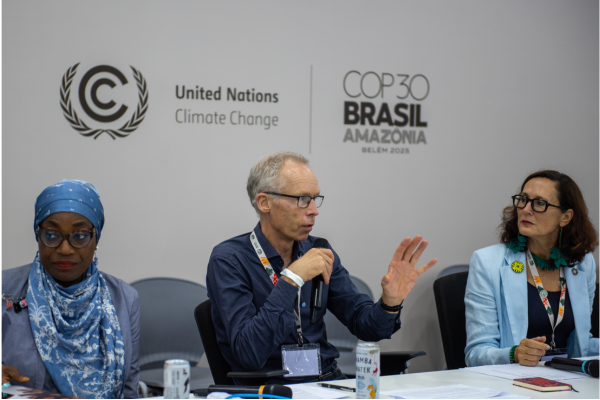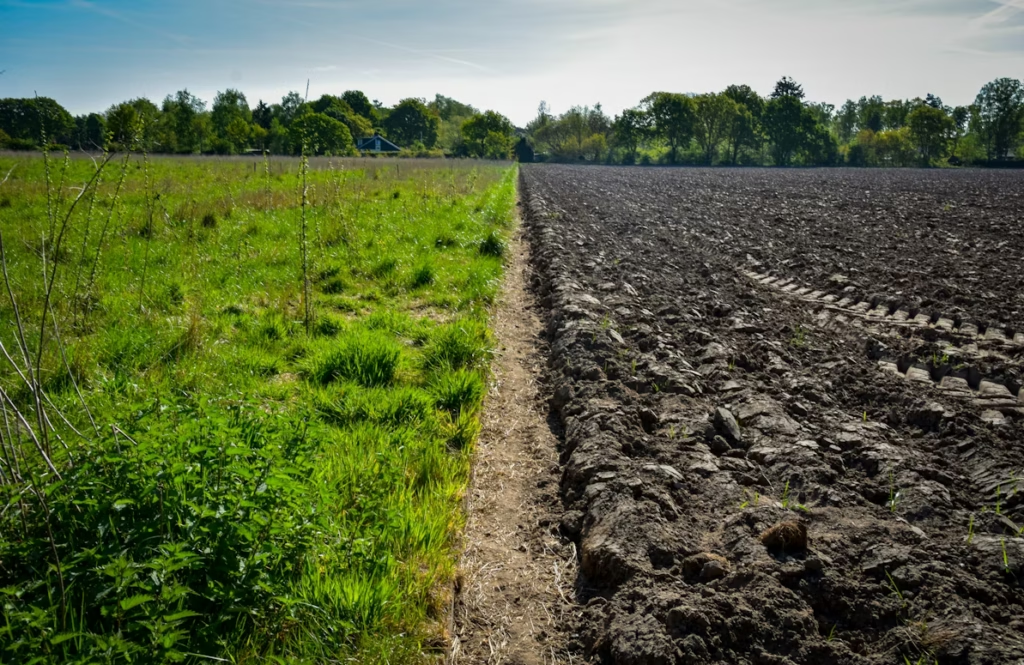On 23 February 2025, parliamentary elections will be held in Germany. Positive visions for the future and the fundamental systemic changes necessary to overcome the overlapping ecological, economic and social crises play a marginal role in election programmes – with government and opposition politicians and the media debate focusing on mono-thematic polarisation.
Viable (financing) ideas for solving acute problems (such as education for all, fair mobility, affordable housing, renewal of dilapidated infrastructure and aging in dignity) are not presented to a sufficient extent, nor is it communicated to people how everyone can win through active climate and resource protection and a social-ecological transformation.
In this context, the book Earth4All Deutschland by the Club of Rome and the Wuppertal Institute was published at the end of 2024, countering this loss of utopia with a positive and scientifically based vision.
There is no doubt that the current economic system has led to an increased average level of prosperity in Germany over the past decades. However, the price for this is expressed not only in the enormous consumption of nature and resources, but also in the increasingly unequal distribution of wealth and social participation. Public infrastructure has been neglected and social cohesion is disintegrating at a rapid pace. The ecological successes achieved (such as in the expansion of renewable electricity generation) should not obscure the fact that Germany, in terms of its ecological footprint, is clearly living beyond its means. Unsustainable modes of production and consumption still predominate. The super-rich contribute to this with an extreme ecological footprint and, despite their “strong shoulders”, make a very modest contribution to solving the problem.
It has long been clear that we must fundamentally renew the foundations of our economic and social order if we want to preserve the social achievements of the fossil age and our liberal-democratic way of life. Instead of continuing to push for courageous change, however, neither politics nor business is effectively contradicting backward-looking populism: what has already been achieved is being questioned, climate protection targets are being weakened, and rhetoric against climate protection measures is polarising and polemicising. It is particularly counterproductive to slow down the socially evolved willingness for more ambitious climate protection, as is being attempted by no small section of the political spectrum. The AfD is even calling for the sheer economic and ecological madness of a refossilisation and renuclearisation of the economy through coal and nuclear power.
In contrast, the long-term goal of Earth4All is a new economic paradigm that enables prosperity for all people – a wellbeing economy – within the planetary boundaries. To this end, Earth4All identifies political measures that have the potential to simultaneously address the multiple crises of our time and to exploit synergies through integrative approaches. Five turnarounds and corresponding political measures are at the centre of this: on poverty, inequality, empowerment, food, and energy. With a courageous Giant Leap, a further escalation of the current polycrisis can be limited. It is possible to make Germany future-proof and worth living in for everyone. And the encouraging thing is that, as surveys by Earth4All show, the proposed measures are generally met with approval in German society:
- 66% of Germans believe that the world will have to take drastic measures in all economic sectors (power generation, transport, buildings, industry, food) in the next ten years.
- The majority believes that wealthy people should pay higher taxes (71%).
- 75% believe that the government should provide free health care. 71% consider it important to strengthen workers’ rights.
However, the figures also show that agreement with the statement that ‘combatting climate change and global environmental damage benefits people’ is surprisingly low at 54% in Germany, putting it third from last among the G20 countries. This requires explanation.
In Germany, comprehensive climate protection can ensure that deadly heavy rainfall events like the one in the Ahrtal in July 2021 do not become the norm. But compared to the tragedies that await people in Africa, Asia and South America – regions where the survey found higher agreement with the benefits of climate action – if climate change is not stopped, these are relatively less catastrophic effects. But that is not a sufficient explanation: could it be that the average citizen has not been made sufficiently aware of the enormous economic and social advantages of climate action, especially for Germany, so that many people still perceive the necessary climate protection measures as a threat?
Could it be that the economic and (also) credit-financed climate action programmes are viewed sceptically because it has not been explained that maintaining the status quo will lead to higher economic damage and even higher adaptation costs if we do not invest heavily in climate protection today?
There is much to support this hypothesis. The fact is that the positive counter-narrative – social gain, greater security and more justice through climate protection, as opposed to exorbitant damage, growing inequality and injustice through a failure to protect the climate – has not been publicised enough in Germany to date. The assumption that something like ‘business as usual’ remains possible is an illusion: even from a purely economic point of view, Germany’s prosperity will also fall radically if we are unable to limit climate change as much as possible.
The Potsdam Institute for Climate Impact Research calculates that the global economy will suffer a 19% loss of income by 2050 due to irreversible climate change. These damages, caused by emissions of the last 40 years, are six times higher than the costs of a 2°C strategy. If we don’t take much more ambitious action than we have so far, the costs will increase to the point of global economic disaster.
Earth4All Germany shows that radical and joint turnarounds in Germany can lead to an enormous improvement in the quality of life for everyone – to a wellbeing society. However, this will only happen if a Giant Leap is made, that is, a major socio-political breakthrough is achieved. According to Earth4All Germany’s analysis, it is much better to change society together and develop a vision of how we want to live in the future than to let circumstances force catastrophic changes on us all. It is therefore not just about ‘averting the apocalypse’ – it is about ‘finally trusting our strength and building a more beautiful life’, as Berthold Brecht put it.
It is important to develop a positive vision of the future that stands in opposition to dystopia, and the cornerstones of such a vision are laid out in Earth for All Deutschland. Such a ‘Giant Leap’ is far more of an opportunity than an obligation, because it ensures prosperity, health, security and democracy. It strengthens civil society, with trade unions that can powerfully represent the rights of workers, with entrepreneurs who take social responsibility and with politicians who courageously want to shape a good future. The task of science is to open up future possibilities, especially in times of crisis, using scientific methods. The task to implement these changes rests with all of us.
Read the Executive Summary of Earth for All Germany in English or German, or purchase a copy.
A positive vision for Germany
- A rapid change for the better is possible: the fossil-fuel and resource-consuming structures established in the course of industrialisation can be transformed into a climate-neutral society that is based much more on a circular economy within the next 25 years.
- Limitless economic growth on a finite planet is impossible – and for that reason alone is not a yardstick for quality of life and a good life. The goal is: wellbeing for all within the planetary boundaries.
- Transforming all areas at the same time is easier than doing so individually: it is more effective, cost-efficient and promising if the turnarounds are implemented together and quickly. Political integration instead of silo thinking can leverage major synergies.
- An ecological transformation without reducing social inequality will fail. Climate and ecosystem protection will only be accepted by society if a significant reduction in inequality and the fight against poverty are tackled at the same time. A fair tax and social policy is a prerequisite for a Giant Leap.
- Technology alone is not the solution to all challenges: increasing efficiency and expanding renewable energies are central strategies. However, in addition, moderate lifestyles (sufficiency) with less luxury consumption and more economical use of resources and land are also needed. Such changes require an enabling culture that promotes sufficient behaviour but discourages excess and over-consumption.
- Transformation processes are best achieved through a strong sense of community. A strong democracy and fair negotiation processes, as well as self-efficacy (empowerment), especially of women and young people, whose rights and needs are still not being heard, are the basis for successful change processes. Participatory elements, such as citizens’ assemblies and a democratised economy, help to close social divides.
- We need bold investments in the future: a consistent reduction of environmentally and climate-damaging subsidies, an appropriate contribution from the wealthy and an adjustment of the debt brake create the basis for this, improve social justice and reduce future damage and adaptation costs.
- Germany has more responsibility: as a leading industrial nation, Germany can take courageous steps to strengthen existing approaches for positive global change. If Germany successfully fulfils its global role model and leadership function, it will create the basis for a global welfare society.



